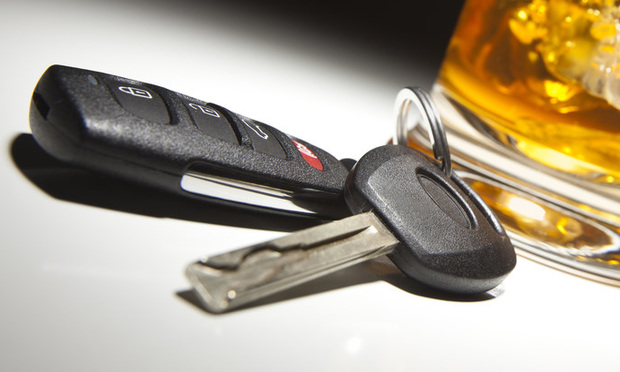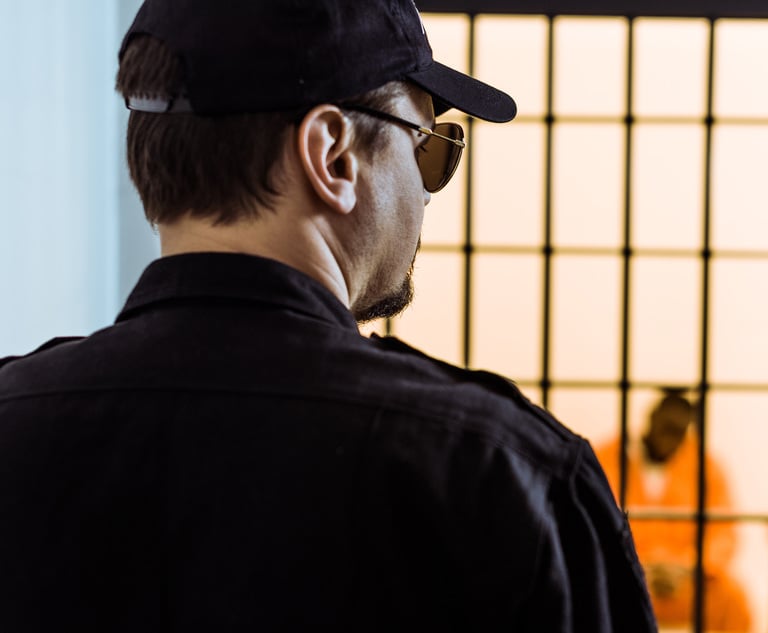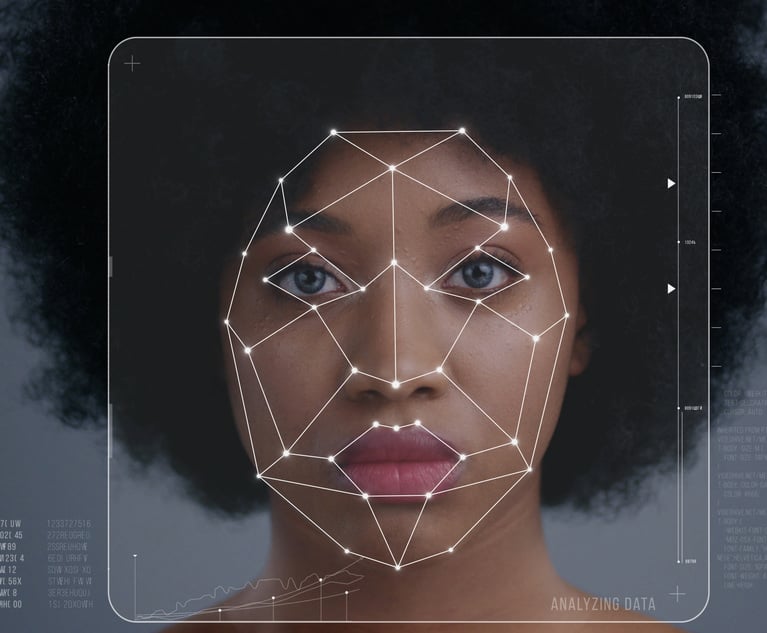'Zalcberg' Ruling Draws Warning That Police May Skip Warrants to Draw Blood
The state court's ruling appears to shake up the U.S. Supreme Court's 2013 decision in "Missouri v. McNeely," which held the natural metabolization of alcohol in a defendant's blood was insufficient to justify a warrantless draw.
April 05, 2018 at 06:36 PM
4 minute read

In light of the New Jersey Supreme Court's Zalcberg decision, some legal observers believe police will be more inclined to draw blood from drunken driving suspects without a warrant.
The court ruled on March 27 in State v. Zalcberg that a suspected drunken driver's constitutional rights were not violated when police had a sample of her blood drawn without her consent at a hospital. There, the court ruled a series of exigent circumstances, including a police force that was not trained in how to obtain warrants by phone, relaxed the need for a warrant and rendered the drawing of blood from Shayna Zalcberg constitutional.
Other exigent circumstances were the presence of multiple injured parties, an unconscious defendant, the evacuation of injured parties by helicopter, the need to reopen the highway after the crash, and a limited number of officers working the crash scene, the court said.
The court's ruling in Zalcberg appears to shake up the U.S. Supreme Court's 2013 decision in Missouri v. McNeely, which held that the natural metabolization of alcohol in a defendant's blood was alone insufficient to justify a warrantless blood draw.
“My fear is it might encourage police officers not to think about warrants entirely,” said Jon-Henry Barr, a past president of the state municipal prosecutor's association. “The appropriate message from this ruling is if it's going to be extremely difficult or impossible to get a warrant, you'll be OK by not getting one. The court seems to go out of its way to explain that [the Zalcberg case] is a limited factual circumstance.”
“I have very limited experience in seeing police go through the hoops of trying to get a telephone warrant. My view is they should always try to get consent and if they can't get consent, then get the warrant,” said Barr, who heads a firm in Clark, New Jersey.
Police officers could use more training on the subject of warrantless blood samples, Barr said.
The case concerned a 2011 crash in Freehold Township in which a vehicle driven by Zalcberg, who had two passengers, struck another car. A passenger in Zalcberg's car, Feliciano Colon, was killed. Police had probable cause to suspect Zalcberg was drunk when paramedics reported she smelled of alcohol, and a small liquor bottle was found on her car's console, according to the court's decision.
“We conclude that the officers' lack of awareness of any formal procedure through which they could obtain a telephonic warrant, coupled with their pre-McNeely belief that they did not need such a warrant, suggests there was no reasonable availability of a warrant,” Justice Faustino Fernandez-Vina wrote for the majority.
One aspect of the Zalcberg ruling that is troubling is its recognition of the arresting officers' professed ignorance of the telephone warrant procedure, said Timothy Farrow of Dash Farrow in Moorestown, a criminal defense lawyer who frequently handles drunken driving cases. Farrow agrees with the court's two dissenters in the Zalcberg case, Justices Barry Albin and Walter Timpone, that an officer's ignorance of the law does not justify violation of an individual's constitutional rights.
What's more, said Farrow, the ruling's grant of an exemption for exigent circumstances “could be interpreted by officers or departments to mean that as long as you document that and it's not bad faith, it's OK if you don't get a warrant. It's definitely going to loosen it up a little bit,” he said.
Farrow said the system for obtaining telephone warrants has improved since the time of the 2011 crash that was at the center of the Zalcberg case. A telephone warrant can be obtained in about a half-hour, he said.
“It's still not what I would call easy and what the officers and prosecutors and judges would call an easy process. At the same time, it's much more efficient than it used to be,” Farrow said.
This content has been archived. It is available through our partners, LexisNexis® and Bloomberg Law.
To view this content, please continue to their sites.
Not a Lexis Subscriber?
Subscribe Now
Not a Bloomberg Law Subscriber?
Subscribe Now
NOT FOR REPRINT
© 2025 ALM Global, LLC, All Rights Reserved. Request academic re-use from www.copyright.com. All other uses, submit a request to [email protected]. For more information visit Asset & Logo Licensing.
You Might Like
View All
In 2-1 Ruling, Court Clears Way for Decade-Old Wrongful Imprisonment Suit
5 minute read
Union Leader Awarded $662K Judgment Against Employer in Decade-Old Wiretap Suit
5 minute read
Virtua Drug Tests Pregnancy Patients Without Consent, NJ Attorney General Alleges in New Suit
3 minute read
'Bewitched by the Technology': $300K to Settle Faulty Facial Recognition
4 minute readTrending Stories
- 1Ex-Kline & Specter Associate Drops Lawsuit Against the Firm
- 2Am Law 100 Lateral Partner Hiring Rose in 2024: Report
- 3The Importance of Federal Rule of Evidence 502 and Its Impact on Privilege
- 4What’s at Stake in Supreme Court Case Over Religious Charter School?
- 5People in the News—Jan. 30, 2025—Rubin Glickman, Goldberg Segalla
Who Got The Work
J. Brugh Lower of Gibbons has entered an appearance for industrial equipment supplier Devco Corporation in a pending trademark infringement lawsuit. The suit, accusing the defendant of selling knock-off Graco products, was filed Dec. 18 in New Jersey District Court by Rivkin Radler on behalf of Graco Inc. and Graco Minnesota. The case, assigned to U.S. District Judge Zahid N. Quraishi, is 3:24-cv-11294, Graco Inc. et al v. Devco Corporation.
Who Got The Work
Rebecca Maller-Stein and Kent A. Yalowitz of Arnold & Porter Kaye Scholer have entered their appearances for Hanaco Venture Capital and its executives, Lior Prosor and David Frankel, in a pending securities lawsuit. The action, filed on Dec. 24 in New York Southern District Court by Zell, Aron & Co. on behalf of Goldeneye Advisors, accuses the defendants of negligently and fraudulently managing the plaintiff's $1 million investment. The case, assigned to U.S. District Judge Vernon S. Broderick, is 1:24-cv-09918, Goldeneye Advisors, LLC v. Hanaco Venture Capital, Ltd. et al.
Who Got The Work
Attorneys from A&O Shearman has stepped in as defense counsel for Toronto-Dominion Bank and other defendants in a pending securities class action. The suit, filed Dec. 11 in New York Southern District Court by Bleichmar Fonti & Auld, accuses the defendants of concealing the bank's 'pervasive' deficiencies in regards to its compliance with the Bank Secrecy Act and the quality of its anti-money laundering controls. The case, assigned to U.S. District Judge Arun Subramanian, is 1:24-cv-09445, Gonzalez v. The Toronto-Dominion Bank et al.
Who Got The Work
Crown Castle International, a Pennsylvania company providing shared communications infrastructure, has turned to Luke D. Wolf of Gordon Rees Scully Mansukhani to fend off a pending breach-of-contract lawsuit. The court action, filed Nov. 25 in Michigan Eastern District Court by Hooper Hathaway PC on behalf of The Town Residences LLC, accuses Crown Castle of failing to transfer approximately $30,000 in utility payments from T-Mobile in breach of a roof-top lease and assignment agreement. The case, assigned to U.S. District Judge Susan K. Declercq, is 2:24-cv-13131, The Town Residences LLC v. T-Mobile US, Inc. et al.
Who Got The Work
Wilfred P. Coronato and Daniel M. Schwartz of McCarter & English have stepped in as defense counsel to Electrolux Home Products Inc. in a pending product liability lawsuit. The court action, filed Nov. 26 in New York Eastern District Court by Poulos Lopiccolo PC and Nagel Rice LLP on behalf of David Stern, alleges that the defendant's refrigerators’ drawers and shelving repeatedly break and fall apart within months after purchase. The case, assigned to U.S. District Judge Joan M. Azrack, is 2:24-cv-08204, Stern v. Electrolux Home Products, Inc.
Featured Firms
Law Offices of Gary Martin Hays & Associates, P.C.
(470) 294-1674
Law Offices of Mark E. Salomone
(857) 444-6468
Smith & Hassler
(713) 739-1250






